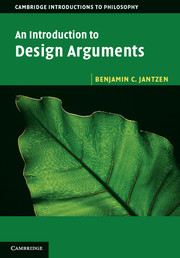Book contents
- Frontmatter
- Dedication
- Contents
- List of figures and tables
- Preface
- 1 Introduction
- 2 Preliminaries
- 3 Arguments from antiquity
- 4 Medieval arguments
- 5 The golden age of natural theology
- 6 Unusual design arguments
- 7 Hume
- 8 Paley
- 9 Darwin
- 10 Loose ends
- 11 The modern likelihood argument
- 12 Intelligent design I: irreducible complexity
- 13 Intelligent design II: specified complexity
- 14 What is complexity?
- 15 Supernatural agents and the role of laws
- 16 A brief survey of physical law
- 17 Fine tuning I: positive arguments
- 18 Fine tuning II: objections
- 19 Conclusion
- Bibliography
- Index
12 - Intelligent design I: irreducible complexity
Published online by Cambridge University Press: 05 June 2014
- Frontmatter
- Dedication
- Contents
- List of figures and tables
- Preface
- 1 Introduction
- 2 Preliminaries
- 3 Arguments from antiquity
- 4 Medieval arguments
- 5 The golden age of natural theology
- 6 Unusual design arguments
- 7 Hume
- 8 Paley
- 9 Darwin
- 10 Loose ends
- 11 The modern likelihood argument
- 12 Intelligent design I: irreducible complexity
- 13 Intelligent design II: specified complexity
- 14 What is complexity?
- 15 Supernatural agents and the role of laws
- 16 A brief survey of physical law
- 17 Fine tuning I: positive arguments
- 18 Fine tuning II: objections
- 19 Conclusion
- Bibliography
- Index
Summary
Introduction to the modern arguments from biology
Modern design arguments that draw upon biological facts are typically grouped under the heading of ‘Intelligent Design’ (or ID for short). The name is apt, if unimaginative. What ID arguments have in common is the relatively modest goal of establishing the existence of a non-human designer without attempting to establish any characteristics of this designer. Additionally, ID arguments purport to abide by the norms of empirical science. Within ID, there are two dominant strands of argument, each appealing to a different feature of organisms to infer design. First, there are those arguments which appeal to ‘irreducible complexity’, a term coined by Michael Behe. The notion of irreducible complexity is tightly bound up with the idea of gradual evolution – the central idea is that irreducibly complex systems cannot be produced by a process of gradual evolutionary change. Arguments based on irreducible complexity generally involve an attempt to identify biological systems with this property, and then to argue from the existence of these systems to the likely intervention of an intelligent agent. In this chapter, we will consider just what the property of irreducible complexity is supposed to be and what sorts of design argument it might support. In the next chapter, we’ll turn to an examination of the second major strand of biological design argument: that which appeals to ‘specified complexity’. As we’ll see, both sorts of argument share a similar structure – a structure with very deep roots in the history of design arguments. This common structure is buried under two different sets of jargon. We will begin digging it out in this chapter by scrutinizing the notion of irreducible complexity.
- Type
- Chapter
- Information
- An Introduction to Design Arguments , pp. 189 - 206Publisher: Cambridge University PressPrint publication year: 2014



